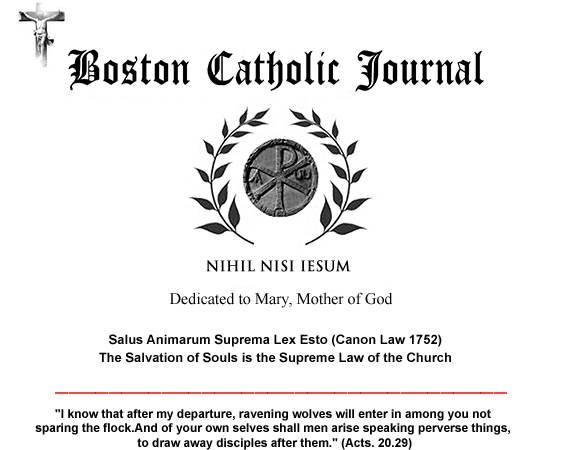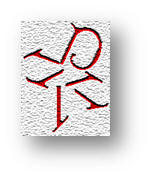|
“Deconstructing”
Christ
|
 |
|
The God we never knew despite all He ever said
“Ego autem dico vobis …” But I tell you ...
There is often such a tremendous disparity between what we read in the Gospels … and what we hear in homilies-as-conjectures at Mass (“Now, this is what I think Christ is telling us here …”) and what we read in the “deconstructed” literature of New Age Catholicism. Things that Christ appears to state very clearly somehow acquire a cognitive opacity such that what He appears to say and what we are told He really means are often quite opposite, or at least open to debate and can be construed quite otherwise.
Pride, appropriately enough, often appears to motivate this effort. “How clever can I prove myself to be”, a priest may ask himself, “in manipulating the words of Christ to endorse a social or political agendum to which I personally subscribe and that I wish to foster within the congregation — even if it undermines or contradicts genuine Church teaching?”
Of even greater concern to us is this: such gratuitous “hermeneutics” or personal interpretations suggest a good deal more than the vanity or pride within those who utter them. Something far greater is at risk, and it can be summarized as this:
The conflict in meaning that we confront — the apparent and obvious meaning, and its “elucidation” or deconstruction into meanings other than (and sometimes even opposite to) the obvious, implies two extremely important and deeply disturbing assumptions: On the one hand, either Christ does not know what He is really saying, or, on the other, we are unable to grasp what He is saying, despite its being perfectly clear to us. In this case either Christ is a fool or we are fools. In our presumably “unlearned” state, then, we need “professionals” to elucidate the true meaning of anything that Christ utters, and this, of course, takes many years of training and the accumulation of multiple academic degrees.
And this is to say that ... much to Christ’s Heavenly Father’s consternation ... what Christ is saying is actually “Hidden from the simple and unlearned, and revealed only to the schooled and wise.” 1 And they, in turn, will reveal it to us, given our pronounced inability to understand the obvious. Take, for example, the following:
“Enter ye in at the narrow gate: for wide is the gate, and broad is the way that leadeth to destruction, and many there are who go in thereat. How narrow is the gate, and strait is the way that leads to life: and few there are that find it!” (St. Mat. 7.13-14)
To those of us who are “unlearned”, Christ seems to be saying — and very clearly — that the way to Hell is easy and a lot of people end up going there; while, on the other hand, the way to Heaven is difficult and not many people make it.
Now, the clear and apparent meaning, of course, makes life a good deal more difficult for us. After all, many will go to Hell and few will go to Heaven — if we take Christ at His word. Jesus warns us of this, or at least appears to be warning us to take our lives on earth — what we do and do not do — seriously, given what appears to be the likelihood of Hell and the uncertainty of Heaven.
What are our options, then? We can either,
-
Call Christ a liar to His face
-
Accuse Him of being delusional
-
Or call into question the veracity, the authenticity, of Sacred Scripture itself since the obvious meaning does not accord with, is not amenable to, what we ourselves would prefer to understand of God.
In fact, the god we choose to fabricate and believe in, has inverted the matter entirely: few or none go to Hell and many, if not all, go to Heaven. Any funeral Mass will attest to this common, however deeply mistaken, assumption. Our dead, we are assured, are already in Heaven smiling benevolently down upon us, and playing basketball, surfing, or golfing on endless courts, seas, or greens. Our priests tell us this universally and our eulogists provide unique glimpses into the beatitude of our deceased in Heaven (that eulogies are strictly prohibited in the Catholic Church is quite beside the point. We have them at every funeral Mass anyway — no matter what the Church teaches.2)
That some of them were cruel, malicious, perverse, brutal, selfish, miserly, indifferent to God in this life, or not believing in Him at all, has no bearing on the matter of death and the circumstances of life beyond it. If the casket makes it into the Church the dead shoot right up to Heaven … regardless of what they have done or failed to do, saint and sinner alike. If “all dogs go to Heaven”, then, a fortiori (that is to say, all the more), so do men. All men. Good, bad, or indifferent.
The problem is that we cannot in the same canon — that is to say, within Sacred Scripture — find one reference to all men, good, bad, or indifferent, attaining to salvation … which is to say, going to Heaven. Not one. In fact, Sacred Scripture speaks of only one man — just one — who is assured of Heaven: the thief on the Cross beside Christ, to whom Christ promised Paradise the day of His own Crucifixion.
Even Saint Paul worried! 3
Not Presumption, but also not Despair!
But neither must we fall into the sin of despair which is the diametric opposite of the sin of presumption! Both are equally wrong and both are gravely sinful. While it is true that many have lived a life deserving of Hell, no one — not one — has lived a life deserving of Heaven. It is never ones right to go to Heaven no matter how exemplary ones life has been. If it is your right to go to Heaven, if you deserve Heaven on your own merits, then you have emptied the Cross of the suffering and death of Jesus Christ, and made His Resurrection unnecessary. Yet we are told in no uncertain terms that, “I am the Way, and the Truth, and the Life. No man cometh to the Father, but by Me.” (St. John 14.6). Now, we must ask ourselves, what could Christ possibly mean in uttering this? Let us debate this terribly abstruse utterance; let us “deconstruct” it to see what He is really saying in this very puzzling statement.
Indeed.
Until we begin to take Christ at His word, and His word at face value, we may find a home in academia or among the pseudo-literati; we may even have the congregation in stitches, but it is unlikely that we will uncover the too-obvious Christ or walk in the company of the Saints with Him when death ends the charade of our pretension to misunderstanding what He said and why He said it.
Ego autem dico vobis
Are there things Christ
said about which we are genuinely unclear? Yes — but by and large they
are few. He speaks with authority, an authority that infuriates the
Pharisees because not only does He state the (Mosaic) Law, but of
Himself supersedes it lest there be any question whence the authority
derives. (from God Himself in His Only begotten Son Who is One with
the Father):
“You have heard that it hath been said, Thou shalt love thy neighbor,
and hate thy enemy. But I say to you (Ego autem
dico vobis), Love your enemies: do good to them that hate you: and
pray for them that persecute and calumniate you.”
(St. Matthew 5.43-44)
The very clarity with which He speaks enraged “the scholars” 2000 years
ago as much as it enrages our scholars today. There is little room for
equivocation — and interpreting the Law is, after all,
a living,
an income, as much 2000 years ago as it is today. Simplicity
impedes this, obviates it altogether! What would so many scholars possibly
do if God spoke to us in a way that even the simple understood? Of course,
not to be outdone by the Son of the Living God Who is the very Word
of the Father, the scholars convince us that the simple is altogether
complex, and the greater its apparent simplicity the greater its complexity
— and our perplexity — and, for a sum, they alone have the credentials
to properly interpret what is so plainly concealed from us in its beautiful
simplicity.
When you go to Mass — that is to say, to the Most Holy Sacrifice of the Mass — listen to what Christ says to you plainly in the Gospel reading, no matter how much it may be interpreted to mean something utterly different, totally irrelevant and in the end merely tiresome and prosaic. He has so much to tell you — Himself! “Qui habet aures audiendi audiat.” 4
_________________________________________
1
See St. Matthew 11.25:
“At that time Jesus answered and said:
I confess to thee, O Father, Lord of Heaven and earth, because Thou
hast hid these things from the wise and prudent, and hast revealed them
to the little ones.”
2 At least one Church
in America, the Blessed Sacrament Church near Fort Mitchell,
KY, a priest explains this clearly in a note to the parishioners. Either
most Catholic Churches are clueless or their priests disobedient
in permitting this. The article appears in its entirety
here.
3
“But
I chastise my body, and bring it into subjection: lest perhaps, when
I have preached to others, I myself should become a castaway.”
(1 Corinthians 9:27)
"With fear and trembling work out
your salvation."
(Philippians 2:12)
4 “He who has ears to hear, let him hear.” (St. Matthew 11.15)
Editor
editor@boston-catholic-journal.com
Boston Catholic Journal
![]() Printable
PDF Version
Printable
PDF Version
Comments?
Write us:
editor@boston-catholic-journal.com
Totally Faithful to the Sacred
Deposit of Faith entrusted to the Holy See in Rome
|






















